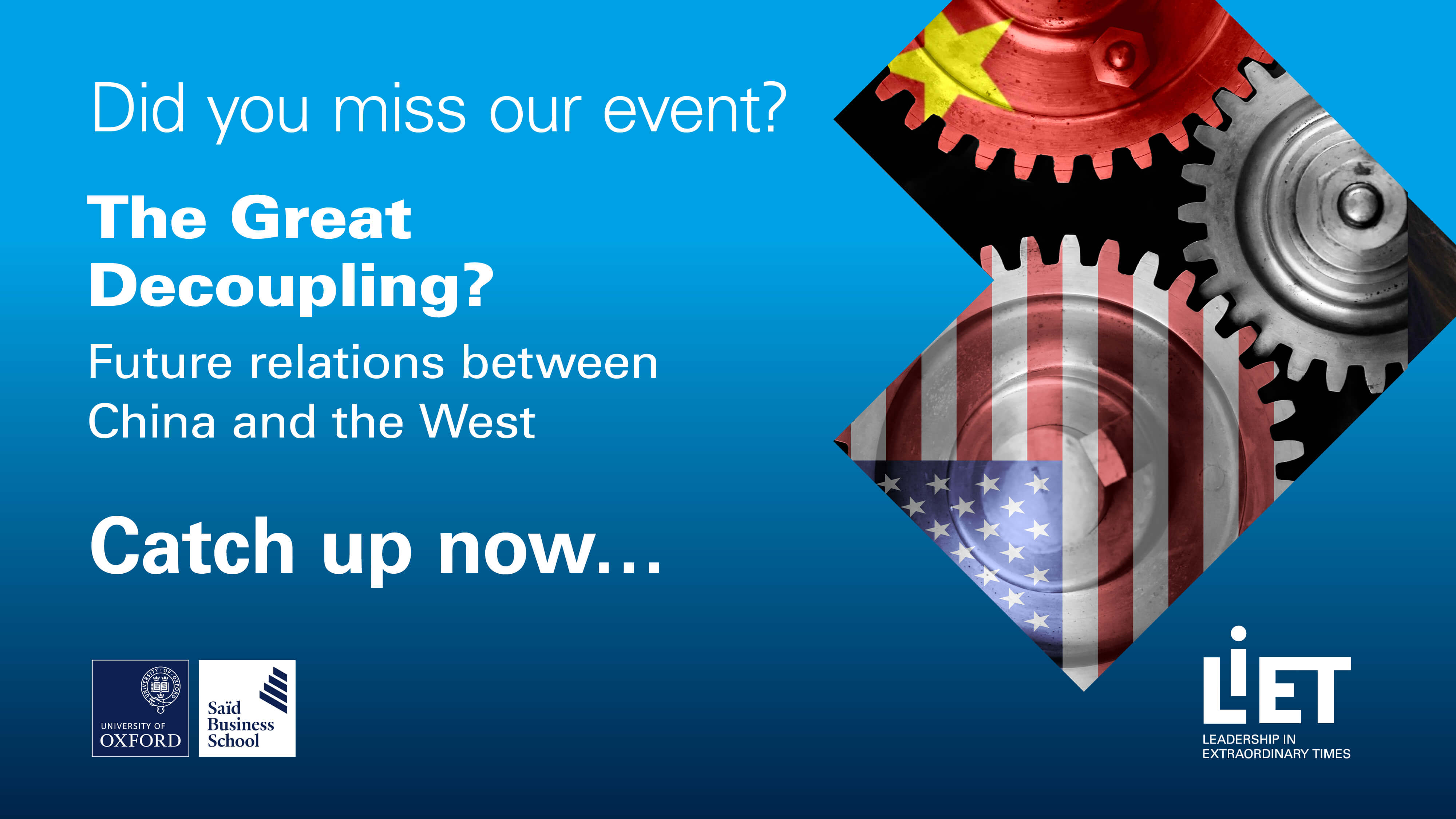The Great Decoupling: A New Era Of Global Economic Relations

Table of Contents
Geopolitical Tensions and the Decoupling Process
Rising geopolitical tensions are arguably the primary driver of the Great Decoupling. The strained relationship between the US and China, exacerbated by trade disputes and technological rivalry, is a prime example. Similarly, Russia's invasion of Ukraine has dramatically accelerated the decoupling process, prompting widespread sanctions and a reassessment of global supply chain vulnerabilities. This shift is reflected in several key trends:
- Increased trade protectionism and tariffs: Countries are increasingly resorting to protectionist measures, imposing tariffs and other trade barriers to shield domestic industries and reduce reliance on foreign suppliers. This includes both bilateral and multilateral trade disputes.
- Sanctions and counter-sanctions: The weaponization of sanctions has become a significant tool in geopolitical strategy, leading to retaliatory measures and further fragmentation of global markets. This creates significant uncertainty for businesses operating internationally.
- Diversification of supply chains away from strategic rivals: Companies are actively diversifying their supply chains to reduce dependence on countries deemed geopolitical rivals. This "friend-shoring" strategy prioritizes partnerships with countries aligned with their own strategic interests.
- Rise of regional trade agreements: As global trade becomes more fragmented, we are seeing a surge in regional trade agreements, such as the CPTPP and RCEP, which prioritize cooperation within specific geographic areas.
This shift toward regionalization is fundamentally altering global supply chains and creating new challenges for businesses navigating this increasingly complex landscape. The impact on global supply chain resilience and efficiency is substantial, forcing companies to adapt quickly to maintain competitiveness.
Technological Competition and National Security Concerns
Technological competition, particularly in critical sectors like semiconductors and artificial intelligence (AI), is another key factor accelerating the Great Decoupling. Concerns about technological dependence and national security are prompting governments to invest heavily in domestic technology sectors and implement stringent export controls.
- Concerns about technological dependence and national security: Nations are increasingly wary of relying on foreign sources for critical technologies, fearing potential vulnerabilities in times of conflict or economic instability. This fuels the push for technological self-reliance.
- Government investment in domestic technology sectors: Governments are providing significant financial support and incentives to bolster their domestic technological capabilities, aiming to become less reliant on foreign technologies and fostering innovation within their borders.
- Export controls and restrictions on technology transfers: Stricter export controls and restrictions on the transfer of sensitive technologies are being implemented to prevent rivals from accessing cutting-edge advancements.
- The rise of domestic champions and strategic industries: Governments are actively nurturing domestic technology companies ("national champions") to compete on the global stage and protect critical industries.
This intense technological competition is reshaping innovation patterns and potentially slowing down the pace of global technological development, as collaboration and knowledge sharing are increasingly constrained.
Economic Impacts of the Great Decoupling
The Great Decoupling carries both potential benefits and drawbacks for the global economy.
- Increased resilience to global shocks for some nations: Diversified supply chains and a focus on domestic production can enhance resilience to global economic shocks and disruptions.
- Potential for slower global economic growth: Increased trade barriers and fragmentation of markets could stifle global economic growth, leading to reduced trade volumes and investment flows.
- Increased costs for businesses due to supply chain disruptions: Re-shoring and diversifying supply chains can increase costs for businesses due to higher transportation expenses, logistical complexities, and potential inefficiencies.
- Shifts in global power dynamics and economic influence: The decoupling process may lead to a reshaping of global power dynamics, with a potential shift away from a unipolar economic order toward a more multipolar one.
The impact varies significantly across different countries and regions, with some benefiting from increased resilience and others facing economic hardship due to reduced trade and investment.
The Future of Global Trade and Investment
The future of global trade and investment in a decoupled world remains uncertain, with several possible scenarios emerging:
- Increased regionalization of trade: Trade is likely to become more regionalized, with stronger economic ties within specific geographic areas.
- The rise of new trade blocs and alliances: New trade blocs and alliances may emerge to facilitate trade and cooperation within specific regions or among like-minded countries.
- The potential for increased competition and fragmentation: The decoupling process could lead to increased competition between regional economic blocs, potentially hindering global economic integration.
- The role of international organizations in managing the transition: International organizations like the WTO will play a crucial role in navigating the complexities of this transition and establishing new rules for international trade and investment.
Adapting to the New Global Economic Landscape
Businesses and governments need to adapt to the challenges and opportunities presented by the Great Decoupling. Strategic responses are essential for navigating this new reality:
- Diversifying supply chains and reducing reliance on single sources: Companies need to diversify their supply chains to mitigate risks associated with geopolitical instability and reliance on single sources.
- Investing in domestic production and technological innovation: Investment in domestic production capabilities and technological innovation is critical for enhancing resilience and competitiveness.
- Adapting to new trade regulations and policies: Businesses must adapt to evolving trade regulations and policies to maintain compliance and access to international markets.
- Strengthening international cooperation in specific areas: Maintaining cooperation in areas of mutual interest, even amidst increasing geopolitical tensions, remains crucial for effective global governance.
Conclusion:
The Great Decoupling is fundamentally reshaping the global economic landscape, creating both significant challenges and new opportunities. Geopolitical tensions and technological competition are driving this shift away from hyper-globalization toward a more fragmented and regionalized world. Understanding the complex drivers and multifaceted impacts of this process is crucial for businesses and governments alike. To navigate this new era effectively, staying informed about the evolving dynamics of The Great Decoupling is paramount. Further research into the implications of this transformative shift is essential for successfully adapting to the challenges and opportunities presented by this new era of global economic relations. Learn more about the intricacies of The Great Decoupling and its impact on your business or country.

Featured Posts
-
 Taiwan Dollars Surge Pressure Mounts For Economic Reform
May 08, 2025
Taiwan Dollars Surge Pressure Mounts For Economic Reform
May 08, 2025 -
 Even A Bad Monkey Adaptation Wont Dim The Brilliance Of Stephen Kings 2025
May 08, 2025
Even A Bad Monkey Adaptation Wont Dim The Brilliance Of Stephen Kings 2025
May 08, 2025 -
 Istoriya Matchiv Ps Zh Proti Aston Villi V Yevrokubkovikh Turnirakh
May 08, 2025
Istoriya Matchiv Ps Zh Proti Aston Villi V Yevrokubkovikh Turnirakh
May 08, 2025 -
 Pakistans Global Trade Ahsans Tech Driven Strategy
May 08, 2025
Pakistans Global Trade Ahsans Tech Driven Strategy
May 08, 2025 -
 The Case For Rogue Avengers Vs X Men
May 08, 2025
The Case For Rogue Avengers Vs X Men
May 08, 2025
